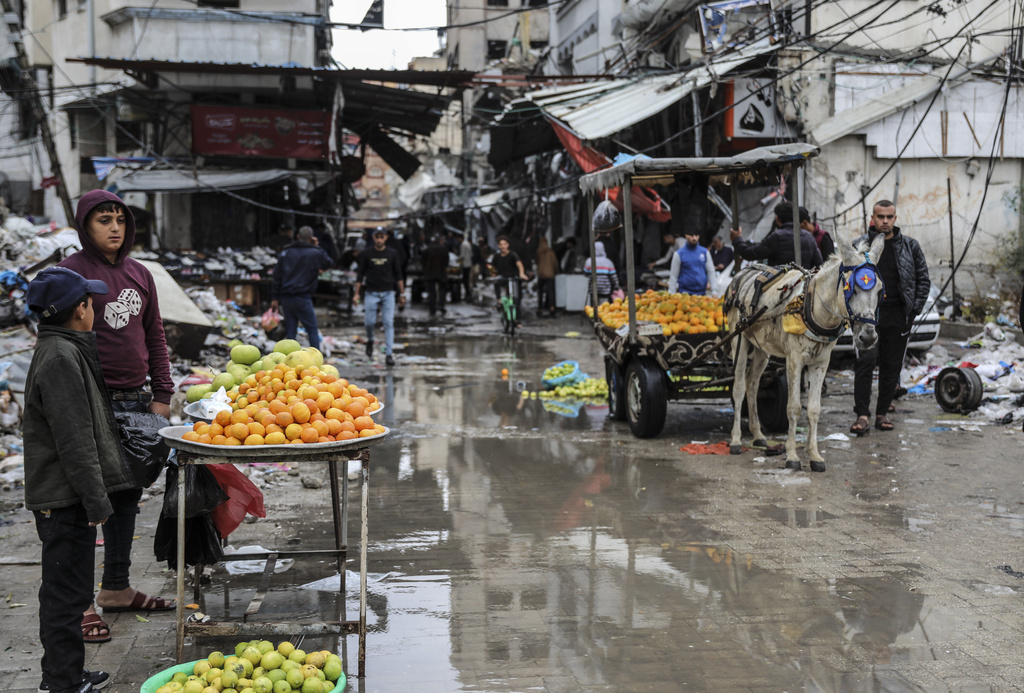(AP) — Hamas and apartheid state Israel agreed to extend their cease-fire for two more days past Monday, raising the prospect of further exchanges of militant-held hostages for Palestinians imprisoned by Israel and a longer halt to their deadliest and most destructive war.
Thirty-three Palestinian prisoners released by Israel arrived early Tuesday in the West Bank town of Ramallah. The prisoners were greeted by loud cheers as their bus made its way through the streets.
The deal for two additional days of cease-fire, announced by Qatar, raised hopes for further extensions, which also allow more aid into Gaza.
Conditions there have remained dire for 2.3 million Palestinians, battered by weeks of Israeli bombardment and a ground offensive that have driven three-quarters of the population from their homes.
Israel has said it would extend the cease-fire by one day for every 10 additional hostages released.

After the announcement by Qatar — a key mediator in the conflict, along with the United States and Egypt — Hamas confirmed it had agreed to a two-day extension “under the same terms.”
But Israel says it remains committed to crushing Hamas’ military capabilities and ending its 16-year rule over Gaza. That would likely mean expanding a ground offensive from devastated northern Gaza to the south.
Monday’s releases bring to 51 the number of Israelis freed under the truce, along with 19 hostages of other nationalities. So far, 150 Palestinians have been released from Israeli prisons.
Hamas and other militants could still be holding up to 175 hostages, enough to potentially extend the cease-fire for two and a half weeks. But those include a number of soldiers, and Hamas is likely to make much greater demands for their release.
The Palestinian prisoners released so far have been mostly teenagers accused of throwing stones and firebombs during confrontations with Israeli forces, or of less-serious offenses.
But some were convicted in alleged attempts to carry out stabbings, bombings and shootings.
Many Palestinians view prisoners held by Israel, including those implicated in attacks, as heroes resisting occupation.
More than 13,300 Palestinians have been killed since the war began, roughly two-thirds of them women and minors, according to the Health Ministry in Hamas-ruled Gaza, which does not differentiate between civilians and combatants.
The Israeli assault has driven three-quarters of Gaza’s population from their homes, and now most of its 2.3 million people are crowded into the south. More than 1 million are living in United Nations (UN) shelters. The Israeli military has barred hundreds of thousands of Palestinians who fled south from returning north.
Rain and wind added to the hardship of displaced Palestinians sheltering in the compound of Al-Aqsa hospital in central Gaza. Palestinians in coats baked flatbreads over a makeshift fire among tents set up on the muddy grounds.
Alaa Mansour said the conditions are simply horrendous.
“My clothes are all wet, and I am unable to change them.” said Mansour, who is disabled. “I have not drunk water for two days, and there’s no bathroom to use.”
The UN says the truce made it possible to scale up the delivery of food, water and medicine to the largest volume since the start of the war. But the 160 to 200 trucks a day is still less than half what Gaza was importing before the fighting, even as humanitarian needs have soared.
Long lines formed outside stations distributing cooking fuel, allowed in for the first time. Fuel for generators has been brought for key service providers, including hospitals and water and sanitation facilities, but bakeries have been unable to resume work, the U.N. said.
Iyad Ghafary, a vendor in the urban Nuseirat refugee camp in central Gaza, said many families were still unable to retrieve the dead from under the rubble left by Israeli airstrikes, and that local authorities weren’t equipped to deal with the level of destruction.
Many say the aid is not nearly enough.
Amani Taha, a widow and mother of three who fled northern Gaza, said she had only managed to get one canned meal from a UN distribution centre since the cease-fire began.
She said the crowds have overwhelmed local markets and gas stations as people try to stock up on basics. “People were desperate and went out to buy whenever they could,” she said. “They are extremely worried that the war will return.”






